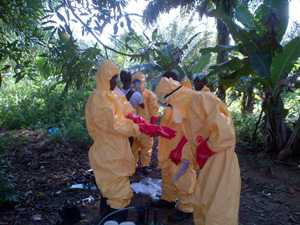Stories From the Field: Infection Prevention & Control - Sierra Leone
Angela C. Dunn, MD MPH
 In a remote village in central Sierra Leone, a 38-year-old businessman went to his village clinic complaining of stomach pain and hiccups. He had recently returned from a business trip to Freetown and was enjoying time with his wife and two children. The clinic nurse knew the man well. He had been diagnosed and treated for peptic ulcer disease in the past. She examined the man by taking his temperature and pushing on his abdomen. Apart from some mild abdominal discomfort, the examination was fairly normal. The nurse gave the man Tylenol and antibiotics, which had relieved his peptic ulcer disease in the past, and sent him home to rest. The next morning, the man died.
In a remote village in central Sierra Leone, a 38-year-old businessman went to his village clinic complaining of stomach pain and hiccups. He had recently returned from a business trip to Freetown and was enjoying time with his wife and two children. The clinic nurse knew the man well. He had been diagnosed and treated for peptic ulcer disease in the past. She examined the man by taking his temperature and pushing on his abdomen. Apart from some mild abdominal discomfort, the examination was fairly normal. The nurse gave the man Tylenol and antibiotics, which had relieved his peptic ulcer disease in the past, and sent him home to rest. The next morning, the man died.
Assuming her husband had died from peptic ulcer disease, the wife began washing his body following their traditional burial practice. The children helped their mother dress their deceased father in his best clothes.
As the family was grieving, a large white SUV arrived at the village. Someone had alerted health authorities of an illegal burial. In Sierra Leone, all deaths must be treated as potential Ebola cases and buried by the government’s safe burial teams. The village chief, however, did not allow the health authorities to take the body and demanded the visitors leave the village immediately. The deceased man’s family hid his body in an unfinished village house. While the village chief did not appreciate the health authorities’ approach, he did agree that a safe burial was warranted. The chief negotiated with the family and health authorities. Accordingly, the family would not continue with the traditional burial; however, the safe burial team would conduct the burial in the village, rather than bringing the deceased to a mass graveyard inaccessible to the family.
The next morning, the safe burial team arrived in the village. An 8-foot deep grave was dug in the land behind the deceased’s home. The burial team donned bright yellow suits— any expressions of compassion hidden by their protective masks. A swab was taken of the corpse’s mouth to test for Ebola. They took the body from the unfinished house and put it into the double body bag while the entire village looked on. The wife alternated between singing and crying as she watched her husband’s body being handled by five burial team members. The burial team carried the body from the house to the grave approximately 100 yards away. Inevitably, the body sagged to the ground, barely avoiding being dragged in the dirt. No one followed the burial team.
The villagers sat on their porches in silence, everyone stoic except for the wife who grieved while her husband’s burial was made very public. Results came back the next day: positive. This was the first case of Ebola in this village. The virus had spread once again. The wife and children who washed and dressed the body would likely contract Ebola, as the deceased man’s body was full of the Ebola virus. However, because the body ultimately received a safe burial, it prevented many other exposures of people in the village.
 Infection prevention and control is crucial in containing the Ebola epidemic; however, to be effective, the local culture needs to be considered. Burial practices in Sierra Leone are mostly determined by religion, local traditions, and secret societies. Fear of the consequences of not following these customs can be more powerful than the fear of Ebola. It is common belief that keeping traditional burial practices not only allows the deceased to pass on to a greater existence, but it also ensures that the village will be protected from hardships. It is believed that if the burial practices are disregarded, the deceased will be forced to wander the Earth tormenting the village with misfortunes.
Infection prevention and control is crucial in containing the Ebola epidemic; however, to be effective, the local culture needs to be considered. Burial practices in Sierra Leone are mostly determined by religion, local traditions, and secret societies. Fear of the consequences of not following these customs can be more powerful than the fear of Ebola. It is common belief that keeping traditional burial practices not only allows the deceased to pass on to a greater existence, but it also ensures that the village will be protected from hardships. It is believed that if the burial practices are disregarded, the deceased will be forced to wander the Earth tormenting the village with misfortunes.
Fortunately, the response from the international community has greatly evolved over the course of the epidemic. Efforts have been made to work within Sierra Leone’s cultural beliefs. Village and religious leaders have now been involved in developing safe burial practices. Burials are allowed to take place within the villages so that the families can observe them and visit the grave. Family members may give the safe burial team a symbolic object that will accompany the deceased in the body bag. This provides the family a bit of peace.
Although safe burial practices are difficult and different from traditional burials, Sierra Leoneans are dedicated to stopping Ebola and have had to break from cultural traditions to honor the deceased. These efforts are monumental, though painful, and have resulted in most burials becoming safe burials in Sierra Leone—an essential and critical step to containing the epidemic.
- Page last reviewed: March 31, 2015
- Page last updated: March 31, 2015
- Content source:




 ShareCompartir
ShareCompartir